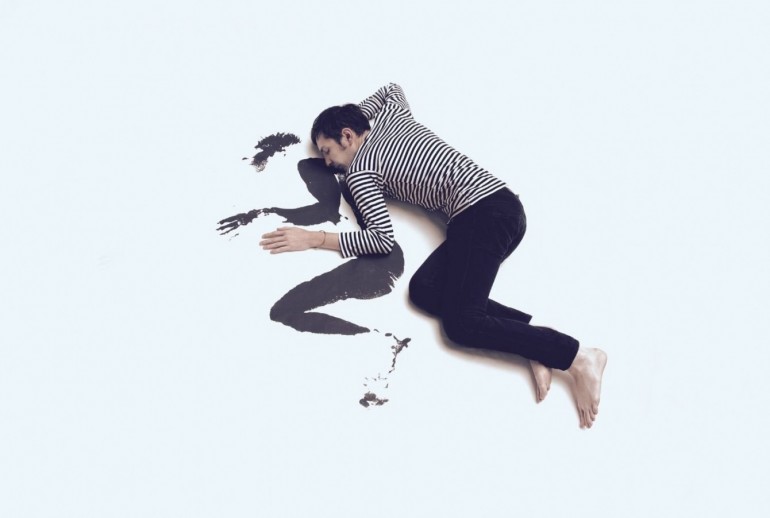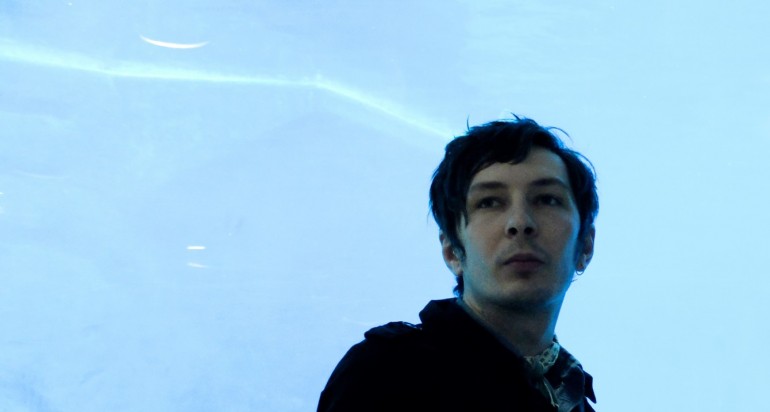
2015 saw the release of two musical works that both deal with humanity’s most peaceful state of mind: sleep. While British composer MAX RICHTER considers his eight-hour-long composition SLEEP a lullaby, Andreas Spechtl of acclaimed Austrian independent rock band JA, PANIK delivers an exploration of intermediate stages such as half-sleep and the break of day/nightfall in terms of eight songs that form his solo debut album Sleep. Now, six months after the release of Sleep, Spechtl gives occasional concerts in cities like Berlin, Munich, and Vienna that reveal the beautiful musicality of the record’s complex structure and sound. NOTHING BUT HOPE AND PASSION editor Chris met Andreas Spechtl at Kantine Berghain in Berlin in order to talk about his debut album, playing live, and sleep as such.
More than half a year after its release it is about time to state that Andreas Spechtl’s first solo album belongs to last year’s most wonderful records. The LP of SLEEP contains a wide range of beautiful and mysterious sounds and creates a calm, yet powerful atmosphere that allows for a listening experience both vivid and hypnotic. At first glance, this collection of eight individual sounding tracks might leave its listeners somewhat puzzled. Still, it is one of those records that becomes accessible by repeated listening. The more often you listen, the more the record offers to explore. Its songs are carefully and neatly composed. Small pieces of lyrics are sung over recurring sound patterns, field recordings, and samples. What first appears to make a rather minimalist impression ultimately turns out to be a sophisticated, multi-layered soundscape.
From Kamasi to Kendrick and beyond
Due to the album’s comprehensive structure and sound it is hard to imagine how a live performance of its eight new songs could work. Therefore, Spechtl follows a creative principle that allows for variation. ‘The main idea is to use the new material in order to present a remix or a dub version of Sleep. Each live presentation of SLEEP will be different and individual. That’s a bit of a jazzy approach’, Spechtl explains. Indeed, free forms of Jazz have been an influence for the musician during the process of creating Sleep: ‘Lately, I’ve started listening to Jazz. I like KAMASI WASHINGTON who was featured on KENDRICK LAMAR‘s ‘To Pimp a Butterfly’. But I also listen to older stuff like JOHN COLTRANE’. However, he does not refer to his music as any kind of Jazz: ‘Very often I tried to work with only one chord and this is very unusual if it comes to that particular genre’.
Andreas, how exactly do you plan to realise Sleep onstage?
Andreas Spechtl: The first time I performed Sleep in front of an audience there was only me using lots of computer samples and a saxophone. By now, the computer has gone and is not part of our live set anymore. Instead, I have two additional live members joining in. Chris Imler is responsible for snare and cymbal as well as lots of pads that he makes use of to create rhythm. Rabea Erradi, on the other hand, takes over the saxophone and also adds bass to our live presentation. And then there is me playing keyboards and guitar. I will also loop certain sounds. It’s an experimental live set. Sometimes it works, sometimes it doesn’t.
While the record Sleep is carefully planned and constructed, its live realisation is work in progress. Andreas Spechtl and his band use additional video footage of colourful forms and underwater scenarios to support the multi-layered vision of the album’s sound. Being at Kantine Berghain, this place seems a bit odd for a live concert of Sleep. The legendary Berghain stands for an environment where at the weekends night turns into day. Here, people stay awake as long as they can or even longer whereas Spechtl’s record can be understood as a manifesto for the comfort of sleep. ‘It’s true’, Spechtl acknowledges, ‘my record is the complete opposite of what the Berghain stands for. But maybe such a contradiction also why it perfectly fits in here’.
How did you come up with the idea of doing a record about sleep at all?
Andreas Spechtl: Throughout the years I collected a lot of stuff on my personal hard drive that I did not make any particular use of. Right at the beginning of last year I started to get through all the material and only then did I realise that a lot of it features a common theme, and that is ‘sleep’. So, I began to explore this theme both musically and lyrically.
I’ve got a lot of unused material lying around. I first had to choose the appropriate songs for the project and only then did I start to work on them.
The lyrics on Sleep are minimalist and all sung in English. Was it hard for you to limit yourself to a small number of words? Considering that the the songs of JA, PANIK includes extensive lyrics this new approach of reduction might have been a challenge for you.
Andreas Spechtl: Yes, it’s been challenging to come up with lyrics for this. If you decide to only use one sentence then this one really has to work. Originally I planned to create an album consisting of instrumental music using no lyrics at all. But then I found that I couldn’t do it. I always arrived at points where I felt that I need to sing something. I just wasn’t happy with the result. At the end of the day I’m possibly too much of a pop musician. (laughs) I really like to sing, you know. I really like doing it. And so I had to.
Did you completely scrap the idea of writing an instrumental record or is that something you can imagine trying again in the future?
Andreas Spechtl: I can absolutely imagine trying it again. But it’s not as easy as you might think it is, especially when you usually write lots of lyrics just like I do for JA, PANIK. It’s important to be satisfied with what one does. I’ve already tried many things that did’t feel right in the end and then I just scrapped the idea. It might seem odd but sometimes you do something and then it does not feel like it is you, although you are doing it, so of course it is you. (laughs)
Speaking of lyrics and vocals, the field recordings that are being used on Sleep include speech as well. How did you decide to choose the right passages?
Andreas Spechtl: Over time I recorded a lot of stuff. So, I immediately made some notes categorising the recordings. Some of them took half an hour or even longer. Then I cut out pieces in order to get less and less material. Originally, it was planned to add more of the field recordings to SLEEP. Now there is much less as originally planned but what I used I think is very pithy. Also, I checked whether these recordings would fit in terms of rhythm and pitch level. Doing all these field recordings was intensive work. You really had to sit down, listen, make notes…
At what time of day did you record the songs for SLEEP?
Andreas Spechtl: I recorded everything late in the day and often I’d record after rehearsals with JA, PANIK and also very quietly at home. Sometimes it was indeed very late and I was tired and then my aim was to see how this state would influence my body as well as my ability to create songs. For example, it occured that I didn’t play the drums as usual. You just do things differently in such a state of mind. It was like an exploration of myself, really.

It is rather obvious that Spechtl is fascinated with the idea of half-sleep, meaning that state of mind ‘when you are still being able to perceive but at the same time already drifting into that other world’, as he explains. This is also the way he thinks the record works: ‘I guess the record really works at the break of day just as it does when night falls. The whole record might be about intermediate stages’. Therefore, it is no surprise that he currently enjoys short naps during the daytime:
‘Afternoon naps should not take any longer than one hour. They are both physically and mentally refreshing’.
There are also uncontrolled or unconscious things happening while we sleep. Just think of dreaming. Do you have recurring dreams or even nightmares?
Andreas Spechtl: Yes, I have one recurring dream since I was a kid and I also experience nightmares. Bad dreams seem more realistic, though. I don’t dream about monsters that are haunting me. Most of the time they deal with specific problems of my life. Also, I’m a heavy sleepwalker. This happens quite a few times throughout the year with different effects. One time I found myself outside my flat in front of a neighbour’s door. (laughs)
As far as I know, I have never sleepwalked but when I was a kid I talked a lot during sleep.
Andreas Spechtl: I don’t do that, I think. At least I haven’t heard about it, yet. (laughs)
Sleep is out via staatsakt/caroline international.
—-



